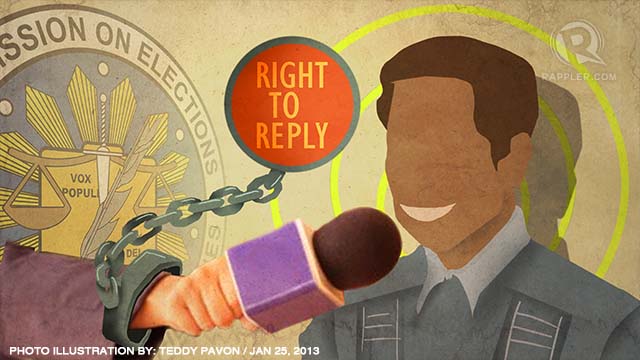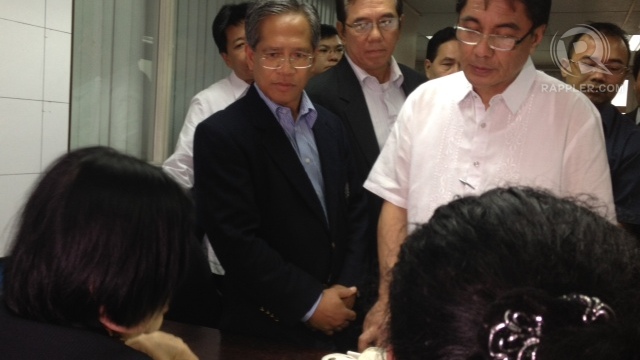SUMMARY
This is AI generated summarization, which may have errors. For context, always refer to the full article.

MANILA, Philippines – If the poll body strictly enforces the “right to reply” rule, a candidate may compel journalists to publish his lengthy reply to a critical piece. And he may force editors to make it their banner story.
Media organizations fear that the controversial provision that the Commission on Elections (Comelec) included in its campaign rules for 2013 will be prone to abuse, but the poll body says there are enough safeguards against whimsical demands from candidates.
The Kapisanan ng mga Brodkaster ng Pilipinas (KBP), GMA Network Inc, and other media outfits have protested this rule, which, according to them, impinges on editorial judgment.
The Comelec, on the other hand, has said this right to reply rule is nothing new – only that this year, the Comelec is more specific about it.
“The right to reply is not Comelec’s invention. It is in the Constitution!” said Comelec Chair Sixto Brillantes Jr on Friday, January 25. He cited Article IX-C, Sec. 4 of the Constitution that says “it is Comelec’s duty to ‘ensure’ that candidates are afforded ‘the right to reply.’”
The right to reply is not COMELEC’s invention. It is in the Constitution!
Under Art. IX-C Sec. 4 of the Constitution, it is COMELEC’sduty to “ensure” that candidates are afforded “the right to reply”.
The cited provision – as uploaded in the Comelec website – does not contain the phrase “right to reply.”
“The Commission may, during the election period, supervise or regulate the enjoyment or utilization of all franchises or permits for… media of communication or information…. Such supervision or regulation shall aim to ensure equal opportunity, and equal rates therefor, for public information campaigns and forums among candidates in connection with the objective of holding free, orderly, honest, peaceful, and credible elections,” says Article IX-C, Section 4.
The phrase “right to reply,” however, may be found in Supreme Court decisions that also quote Article IX-C, Section 4. The quoted provisions say “such supervision or regulation shall aim to ensure equal opportunity, time, and space, and the right to reply.”
Signed in February 2001, Republic Act No. 9006, or the Fair Elections Act, likewise states the right to reply rule.
Section 10 of this law says: “All registered parties and bona fide candidates shall have the right to reply to charges published against them. The reply shall be given publicity by the newspaper, television and/or radio station which first printed or aired the charges with the same prominence or in the same page or section or in the same time slot as the first statement.”
The same text appears in Comelec Resolution No. 9615, promulgated last January 15 to set this year’s campaign rules.
It’s different because…
In Resolution No. 9615, this text is followed by a procedure for complaints. This makes the rules for 2013 different, Comelec spokesman James Jimenez said Thursday, January 24.
The Comelec outlines the following steps:
-
The candidate invoking the right to reply should submit a formal, verified claim against the media outlet involved. He or she should submit the claim to the regional election director or, if running in the National Capital Region, to the Comelec’s Education and Information Department (EID) based in Intramuros, Manila. The claim should state the case in detail.
-
Within 24 hours, the Comelec should endorse the complaint to the media outlet involved.
-
Also within 24 hours, the media outlet should submit a report to the Comelec – through the regional director or the EID – on the action it has taken to address the claim.
“It is very different because in previous elections, it was more of a motherhood statement than anything else. Right now we put the procedure in there. That’s the main difference,” Jimenez said in an interview with reporters.
He explained: “In the past, when you say right of reply, it’s something that a lot of people like to agree with, because no one disagrees with that concept, but there’s a lot of difference in terms of how you’re actually going to operationalize it – which is why we’re also being careful with that.” (Watch more in the video below)
Jimenez acknowledged it is industry practice to grant the right to reply. It is “essentially the offer to interview the other side to get his side before the story actually goes to print or is actually published,” he said.
He said Resolution No. 9615 simply allows candidates to tell the Comelec if this right is violated. The Comelec “can handle that on a case-to-case basis,” he explained, adding that the poll body will act as a “conduit” between the candidates and the media.
“In fact, if you look at the resolution, the coercive part of it is not really dwelt upon. It’s more on the, ‘Let’s talk about whether or not this thing happened, and then let’s arrive at a mutually satisfactory solution,’ considering the requirements and the unique nature of reporting,” Jimenez said.
‘Respect editorial judgment’
While it is industry practice to seek the reply of affected parties, the Philippine media has long opposed moves to legislate the right to reply. In 2009, the Center for Media Freedom and Responsibility said a right to reply bill “will undermine the editorial prerogative of deciding what to air or print that’s at the core of the exercise of press freedom in the newsroom.”
In its motion for reconsideration filed Thursday, the KBP took a similar stance.
“The KBP has always taken the position, and herein likewise submits, that the provision on the right to reply is unconstitutional as it impinges on the editorial prerogative of media. What is ethically required of media is balanced and fair reporting,” the KBP said.
Broadcast giant GMA Network Inc, which is not a KBP member, said it “foresees problems” with the right to reply provision. GMA Network said its news programs “will be inundated by demands” by various candidates for their right to reply.
In a letter on Wednesday, January 23, the network asked the Comelec to give it “leeway…to determine on its own which matters are newsworthy enough to air on its programs and not to be burdened with the submission of reports of claims invoking said right to reply and/or to air a candidate’s reply.”
“With all due respect, GMA has garnered 50 years of experience and expertise to know when it is necessary to air the other side and to correct itself in the event of an erroneous news report,” GMA Network said.
Brillantes, however, said the right to reply “should not be feared by those who are already practicing balanced reporting.”
The right to reply provision should not be feared by those who are already practicing balanced reporting.
Brillantes said that on January 31, the Comelec will hold a public hearing on KBP and GMA-7’s appeals. The media landscape – which involves the audience, the public – is at stake. – Rappler.com
Add a comment
How does this make you feel?






There are no comments yet. Add your comment to start the conversation.